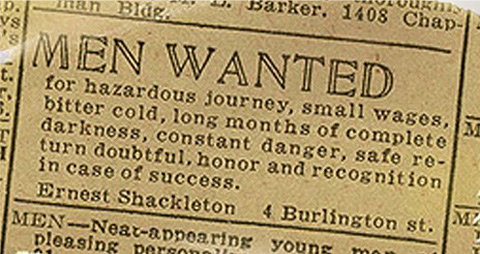RISK IS GOOD
Recently, a client sent us an email.
As General Legal Counsel, we expected it to say, in a very long-winded way, that the controversial campaign we’d developed was going to make his life a misery.
We also anticipated it would go on to request we go back and come up with something that would enable him to spend more time with his family rather than in front of a judge.
However, to our surprise, it didn’t.
The first line of the email included the words ‘…risk is good…’. After that, everything else took care of itself.
This got me thinking.
Is risk a good thing to encourage in advertising, or is it a mis-judged tool used by carefree creative agencies to cajole the client into doing work for selfish reasons?
In many walks of life, risk isn’t good at all. For example, my morning commute on the bike would undoubtedly be better if I wasn’t viewed as a terrorist by taxi drivers, and not seen at all by pedestrians.
But, while risk might not be good in itself, it remains absolutely necessary. It’s a natural by-product of innovation and is a must-have if society is to progress.
Before being retired, the space shuttle had over 700 components designated as ‘critical 1’; meaning by their very design have no backup to save the crew should they fail. And sometimes they did with catastrophic consequences. But this didn’t stop it launching 135 times.
When Shackelton first recruited for his arduous but triumphant tour of the Antarctic, his advert was clear and unambiguous. There would be a strong possibility of death. Motivating stuff.
When the great physicists of the 30s began hurling neutrons at other neutrons in the pursuit of new sources of power, they weren’t entirely sure they wouldn’t blow themselves and half the world up at the same time.
But what united all these people was their frustrated ambition. They didn’t just dare to dream but dared to do. Their default outlook was to give something a go, rather than look for reasons to stay at home.
But they weren’t careless; the risks were identified & carefully managed. What they also realised was not all risk can ever be mitigated – and it is with this philosophy they were able to justify stepping up to the plate.
And hereby lies the most inspiring truth of all. In each case there was a strong opposing force at play compelling them to move forward regardless; the powerful ‘reverse concept’ of risk – opportunity.
The opportunity to advance, to progress, to move forward.
With risk being increasingly bred out of our society, we have to be careful that risk-aversion doesn’t become the de facto position.
In our day-to-day jobs, this won’t be achieved by moaning about wanting clients to take more risks. This is futile and scary, and can make you come across as a wanker.
A big part of our job is helping clients see the opportunity in risk – the progression it can bring about for their product, brand and themselves – while simultaneously mitigating any foreseeable bumps in the road.
So, if your client likes to evaluate work through the lens of ‘all the things that can go wrong’, don’t self-harm. Instead, try spending a corresponding amount of time encouraging them to collectively enthuse about all the upsides too.
Let’s help them see the ‘what if’, rather than being preoccupied with what disaster might befall.

